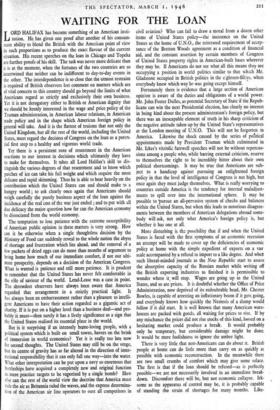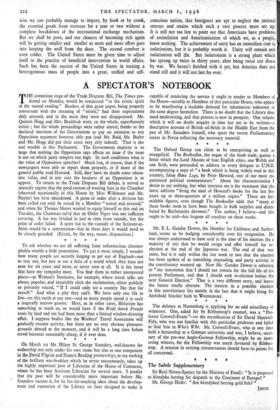WAITING FOR THE LOAN
LORD HALIFAX has become something of an American insti- tution. He has given one proof after another of his consum- mate ability to blend the British with the American point of view in such proportions as to produce the exact flavour of the current situation. His recent speeches on the loan in Chicago and Topeka are further proofs of his skill. The task was never more delicate than it is at the moment, when the fortunes of the two countries are so intertwined that neither can be indifferent to day-to-day events in the other. The interdependence is so close that the utmost restraint is required of British observers lest comment on matters which are of vital concern to this country should go beyond the limits of what Americans regard as strictly and exclusively their own business. Yet it is not derogatory either to British or American dignity that we should be keenly interested in the wage and price policy of the Truman administration, in American labour relations, in American trade policy and in the shape which American foreign policy in general will take. And it is the flattest of truisms that not only the United Kingdom, but all the rest of the world, including the United States, must regard the decision of Congress on the loan as a poten- tial first step to a healthy and vigorous world trade.
Yet there is a persistent note of resentment in the American reactions to our interest in decisions which ultimately they have to make for themselves. It takes all Lord Halifax's skill to dis- tinguish the various degrees of that resentment and to know which patches of ice can take his full weight and which require the most delicate and rapid skimming. Thus he is able to bear heavily on the contribution which the United States can and should make to a hungry world ; to ask clearly once again that Americans should weigh carefully the purely business aspect of the loan against the incidence of the real cost of the war just ended ; and to put with all due delicacy the major question how far can the American economy be dissociated from the world economy.
The temptation to lose patience with the extreme susceptibility of American public opinion in these matters is very strong. How can it be otherwise when a single thoughtless decision by the Ministry of Food can suddenly reveal to the whole nation the abyss of shortage and frustration which lies ahead, and the removal of a few packets of dried eggs can do more than months of argument to bring home how much of our immediate comfort, if not our ulti- mate prosperity, depends on a decision of the American Congress. What is wanted is patience and still more patience. It is prudent to remember that the United States has never felt comfortable in the role of saviour of the world. Lend-Lease was a case in point. The shrewdest observers have always been aware that America regarded that arrangement in a strictly practical light. It has always been an embarrassment rather than a pleasure to intelli- gent Americans to have their action regarded as a gigantic act of charity. If it is put on a higher, level than a business deal—and pro- bably it must—then surely it has a lively significance as a sign that the United States realised its essential place in the world.
But is it surprising if an intensely home-loving people, with a political system which is built on small towns, havers on the brink of immersion in world economics? Yet it is really too late now for second thoughts. The United States may still be on the verge, but its centre of gravity has so far altered in the direction of inter- national responsibility that it can only fall one way—into the water. What other interpretation can be put upon a navy so enormous that battleships have acquired a completely new and original function as mere practice targets to be vaporised by a single bomb? How else can the rest of the world view the doctrine that America must rule the air as Britannia ruled the waves, and the express determina- tion of the American air line operators to oust all competitors in civil aviation? Who can fail to draw a moral from a dozen other items of United States policy—the insistence on the United States as the home of U.N.O., the reiterated requirement of accep- tance of the Bretton Woods agreement as a condition of financial aid, and the constant assertion by certain members of Congress of United States property rights in American-built bases wherever they may be. If Americans do not see what all this means they are occupying a position in world politics similar to that which Mr. Gladstone occupied in British politics in the e:ghteen-fifties, when everybody knew which way he was going except himself.
Fortunately there is evidence that a large section of American opinion is aware of the duties and obligations of a world power. Mr. John Foster Dulles, as potential Secretary of State if the Repub- licans can win the next Presidential election, has clearly no interest in being kind about the present administration's foreign policy, but there was an inescapable element of truth in his sharp criticism of the negative attitude taken up by the United State's representatives at the London meeting of U.N.O. This will not be forgotten in America. Likewise the shock caused by the series of poritical appointments made by President Truman which culminated in Mr. Ickes's vitriolic farewell speeches will not be without repercus- sions among a people who, while barring external criticism, reserve to themselves the right to be incredibly bitter about their own political shortcomings. It may be true that Americans are sub- ject to a handicap against pursuing an enlightened foreign policy in that the level of intelligence of Congress is not high, but once again they must judge themselves. What is really worrying to countries outside America is the tendency for internal maladjust- ments to spill over into the international sphere. It may be possible to pursue an all-pervasive system of checks and balances within the United States, but when this leads to notorious disagree- ments between the members of American delegations abroad some- body will ask, not only what America's foreign policy is, but whether it has one at all.
More disturbing is thz possibility that if and when the United States is faced with the first symptoms of an economic recession an attempt will be made to cover up the deficiencies of economic policy at home with the simple expedient of exports on a vas. scale accompanied by a refusal to import to a like degree. And when such liberal-minded journals as the New Republic start to assess the absorptive capacity of the Russian market while writing off the British exporting industries as finished it is permissible to wonder where it will stop. Wages are going up in the United States, and so are prices. It is doubtful whether the Office of Price Administration, now deprived of its redoubtable head, Mr. Chester Bowles, is capable of arresting an inflationary boom if it gets going, and everybody knows how quickly the Nemesis of a slump would follow if it did start. It is well known that many American ware- houses are packed with goods, all waiting for prices to rise. If by any mischance the prices did not rise stocks of this kind, loosed on a hesitating market could produce a break. It would probably only be temporary, but considerable damage might be done. It would be mere foolishness to ignore the amber light.
There is very little that non-Americans can do about it. British people at home can do little more than carry on as quickly as possible with economic reconstruction. In the meanwhile there are two small crumbs of comfort which may give some solace. The first is that if the loan should be refused—as is perfectly possible—we are not necessarily involved in an immediate break- down. Discomfort there will be, but not economic collapse. Irk- some as the apparatus of control may be, it is probably capable of standing the strain of shortages for many months. Like- wise we can probably manage to import, by hook or by crook, the essential goods from overseas for a year or two without a complete breakdown of the international exchange mechanism. But we shall be poor, and our chances of becoming rich again will be getting smaller and smaller as more and more effort goes into keeping the wolf from the door. The second comfort is even colder. The United States must be given time to adjust itself to the practice of beneficial intervention in world affairs. Such has been the success of the United States in turning a heterogeneous mass of people into a great, unified and self- conscious nation, that foreigners are apt to neglect the _internal stresses and strains which such a vast process must set up. It is still not too late to point out that Americans have problems of assimilation and Americanisation of which we, as a people, know nothing. The achievement of unity has an immediate cost in isolationism, but it is probably worth it. Unity will remain and isolationism will die. But isolationism is a strong plant which has sprung up twice in thirty years, after being twice cut down by war. We haven't finished with it yet, but America does not stand still and it will not last for ever.



























 Previous page
Previous page